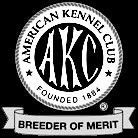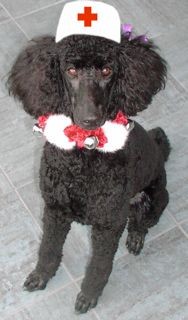|
|
|
Julie
Borst Reed |
|
u |
| u |
| Breeder
Ethics Questionnaire |
| u |
| Puppy Comes Home |
| u |
| u |
| Puppy Temperament Testing |
| u |
| Recommended Diet |
| u |
| FAQs
About Feeding Raw |
| u |
| REAL Dog Food |
| u |
| Fleas 101 |
| u |
| Standard
Poodle Health Concerns |
| u |
| Recommended Vaccination Schedule |
| u |
| Vaccination Decisions |
| u |
| Neutering |
| u |
| Photo Gallery |
| u |
| A Breeder's Life |
| u |
|
Interview
with Dog Breeders' Guild |
| u |
| Poodle Funnies |
| u |
| Tiara Home |
| u |
| u |

|
|
|
| The
Leading Standard Poodle Health Concerns To Know In addition to the diseases that can be screened with the results posted to www.offa.org *, a Standard Poodle owner or perspective owner should learn about these commonly seen diseases that do not have health screenings available at this time. I have them listed 1-3 below. Tiara screens and certifies for over seven concerns in each breeding candidate and the Std Pdls are then designated CHIC**. The three diseases below can not be screened for prior to or without the dog actually being sick with the disease and present a real problem for Standard Poodle fanciers throughout the world. It is advisable to know about these diseases if you live with a Standard Poodle: |
|
| 1) Addison' s disease |
|
| 2) Bloat | |
| 3) Toe Cancer | |
The Canine Health Information Center, also known as CHIC, is a centralized canine health database jointly sponsored by the AKC/Canine Health Foundation (AKC/CHF) and the *Orthopedic Foundation for Animals (OFA). **CHIC Mission Statement
To provide a source of health information for owners,
breeders, and scientists, that will assist in breeding healthy
dogs. Standard Poodle Health
Screenings Required for CHIC Designation (Phenotypic health screening evaluations included only. Std
Pdls do have a genetic, DNA test for von Willebrands disease and
responsible breeders have this test run and register those results
as well.)
Health
Elective (One of the following tests)
CHIC Goals
CHIC Benefits
Once in place and accepted within the dog breeding community,
the CHIC program offers benefits to breeders, buyers, parent
clubs, and researchers.
CHIC Policies and Guidelines
The CHIC database is a tool that collects health information
on individual animals from multiple sources. This centralized pool
of data is maintained to assist breeders in making more informed
breeding choices, and for scientists in conducting research. In
order for data to be included in CHIC, test results must be based
on scientifically valid diagnostic criteria. Breed Specific
Core to the CHIC philosophy is the realization that each
breed has different health concerns. Not all diseases have known
modes of inheritance, nor do all diseases have screening tests.
Some screening tests are based on phenotypic evaluation, others on
genetic testing. With all these variables, a key element of CHIC
is to customize or tailor the CHIC requirements to the needs of
each breed. These unique requirements are established through
input from the parent club prior to the breed's entry into the
CHIC program. Breed specific requirements typically consist of the
inherited diseases that are of the greatest concern and for which
some screening test is available. Each parent club also drives
specific screening protocols. As an example, one parent club may
allow cardiac exams to be performed by a general practitioner.
Another parent club may require the exam to be performed by a
board certified cardiologist. A club may also use the CHIC program
to maintain information on other health issues for anecdotal
purposes. Later, as screening tests become available, the disease
may be added to the breed specific requirements. Identification
Regardless
of breed, each dog must be permanently identified in order to have
test results included in CHIC. Permanent identification may be in
the form of microchip or tattoo.
|
|




